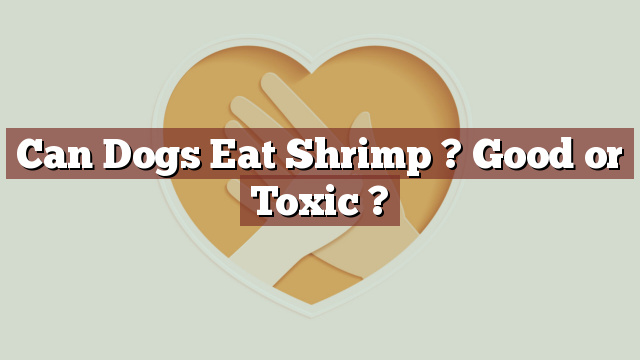Can Dogs Eat Shrimp? Good or Toxic?
Ensuring the well-being of our furry companions is of utmost importance to any responsible pet owner. A crucial aspect of their care is providing them with a well-balanced diet that supports their overall health. As such, it is essential to be knowledgeable about what foods are safe for our pets to consume. In this article, we will delve into the question of whether dogs can eat shrimp and explore the potential risks and benefits of feeding them this seafood delicacy.
Nutritional Value of Shrimp: Essential Minerals and Protein
Shrimp, known for its delicate flavor and tender texture, is a popular seafood choice for many people. This crustacean is not only a delectable treat for humans but also offers a range of nutritional benefits. Shrimp is a low-calorie food that is rich in essential minerals such as selenium, phosphorus, and zinc. Moreover, it is an excellent source of protein, which is essential for the growth and repair of body tissues.
Can Dogs Eat Shrimp? Understanding Safety and Toxicity
Can dogs eat shrimp? The answer is yes, dogs can indeed eat shrimp. However, there are some precautions to keep in mind. While shrimp itself is not toxic to dogs, it is crucial to ensure that the shrimp is properly cleaned, cooked, and served without any seasonings or additives. Seasonings like garlic, onion, or excessive salt can be harmful to dogs and should be strictly avoided. Additionally, it is essential to remove the shell and tail of the shrimp, as they can pose a choking hazard or cause digestive issues for our canine companions.
Potential Risks or Benefits of Feeding Shrimp to Dogs
Feeding shrimp to dogs in moderation can have certain health benefits. The protein content in shrimp can contribute to a well-rounded diet for dogs, especially those with protein sensitivities. However, it is important to note that shrimp should not become a staple food in a dog’s diet, as an excessive intake of seafood may lead to an imbalance in their overall nutrient intake. Additionally, some dogs may be allergic to shellfish, including shrimp, so it is crucial to introduce this food gradually and monitor for any adverse reactions.
What to Do if Your Dog Eats Shrimp: Concerns and Recommendations
If your dog happens to snatch a piece of shrimp or indulge in a shrimp-based dish, there are a few concerns to consider. Firstly, if the shrimp was cooked with harmful seasonings or additives, it is advisable to contact your veterinarian immediately. They will be able to evaluate the situation and advise accordingly. Secondly, if your dog shows any signs of an allergic reaction, such as itching, swelling, or difficulty breathing, seek veterinary attention promptly.
Conclusion: Moderation and Consultation Key for Canine Shrimp Consumption
In conclusion, while dogs can eat shrimp, it is essential to exercise caution and moderation. Shrimp can be a healthy addition to a dog’s diet when served plain, properly cooked, and without any harmful seasonings. As with any new food, it is advisable to introduce it gradually and be attentive to any adverse reactions. Consulting with your veterinarian beforehand can provide further guidance tailored to your dog’s specific dietary needs. Remember, the key to a happy and healthy dog lies in a balanced and well-informed diet.
Thank you for investing your time in exploring [page_title] on Can-Eat.org. Our goal is to provide readers like you with thorough and reliable information about various dietary topics. Each article, including [page_title], stems from diligent research and a passion for understanding the nuances of our food choices. We believe that knowledge is a vital step towards making informed and healthy decisions. However, while "[page_title]" sheds light on its specific topic, it's crucial to remember that everyone's body reacts differently to foods and dietary changes. What might be beneficial for one person could have different effects on another. Before you consider integrating suggestions or insights from "[page_title]" into your diet, it's always wise to consult with a nutritionist or healthcare professional. Their specialized knowledge ensures that you're making choices best suited to your individual health needs. As you navigate [page_title], be mindful of potential allergies, intolerances, or unique dietary requirements you may have. No singular article can capture the vast diversity of human health, and individualized guidance is invaluable. The content provided in [page_title] serves as a general guide. It is not, by any means, a substitute for personalized medical or nutritional advice. Your health should always be the top priority, and professional guidance is the best path forward. In your journey towards a balanced and nutritious lifestyle, we hope that [page_title] serves as a helpful stepping stone. Remember, informed decisions lead to healthier outcomes. Thank you for trusting Can-Eat.org. Continue exploring, learning, and prioritizing your health. Cheers to a well-informed and healthier future!

